Bearded dragons are fascinating creatures that make lovely pets. They are omnivores, eating both animals and plants, and they enjoy devouring a variety of fruits, vegetables, and insects. While some of their favorite meals include crickets, mealworms, and collard greens, it’s essential to know if a particular food is safe for them to avoid health issues. In this article, we’ll focus on blueberries and answer the age-old question: can bearded dragons eat blueberries?
Bearded Dragons: What They Are
Bearded dragons are amazing reptiles which can become a great pet. They are friendly, docile, and easy to care for. If you’re considering getting a new pet, you might want to consider a bearded dragon. TLet’s start with some information you need to know about these fascinating creatures, from their physical characteristics to their diet and habitat.
Physical Characteristics
Bearded dragons are named after the spiny “beard” under their chin, which they puff up when threatened or excited.
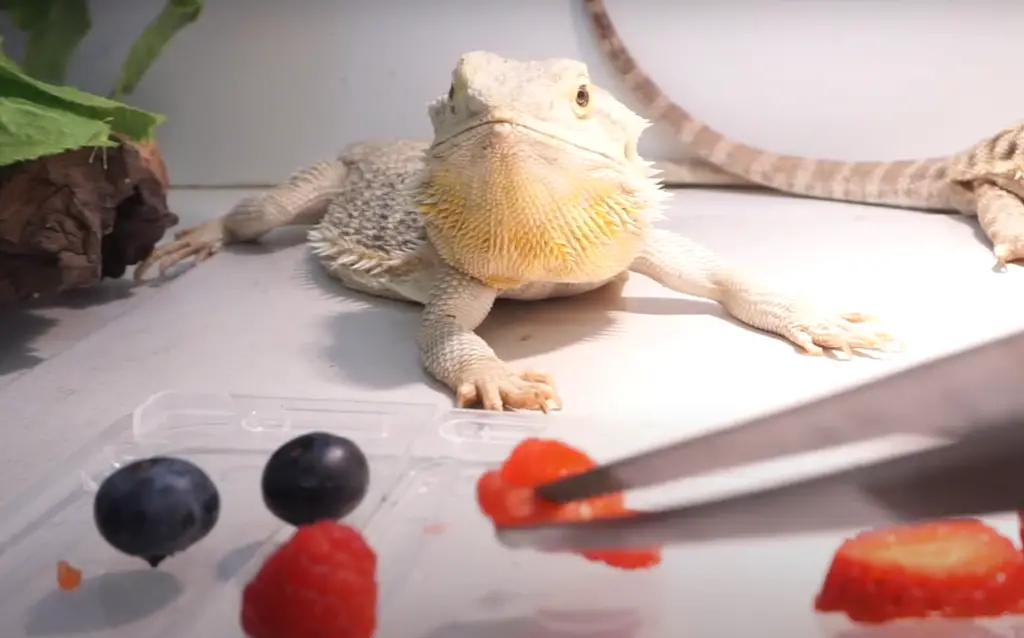
They have a flat body with a triangular head and a long tail that makes up about two-thirds of their body length. They can grow up to 24 inches long. These reptiles come in different colors, including brown, red, yellow, and orange. [1]
Diet
It is important to note that these pets are omnivorous, it means that they eat both animals and plants. They need a varied diet that includes insects such as mealworms and crickets as well as vegetables like kale, carrots, and squash. You can also feed them small amounts of fruit like apples and strawberries. It’s important to provide calcium supplements to help them maintain healthy bones.
Habitat
Bearded dragons originate from Australia but are popular pets worldwide. In the wild, they live in arid, rocky regions, so they require a similar environment in captivity. You’ll need a terrarium that’s at least 40 gallons in size with a basking spot where they can sunbathe.
Personality
Bearded dragons are known for being really friendly and docile. They enjoy being held and will even climb onto your shoulder to bask in the sun. They are relatively quiet and won’t make a lot of noise or mess. However, they do require some attention and interaction to stay healthy and happy.
Health
Generally speaking, bearded dragons are pretty healthy pets but can still be prone to certain illnesses. Some common health issues include impactions (from eating substrate), respiratory infections, and metabolic bone disease. Regular vet checkups are necessary if you want your reptile pet to be healthy.

Bearded dragons may require some specific care and attention, but they are well worth it for anyone who wants a friendly and docile pet. With proper feeding, housing, and care, you can enjoy the companionship and love of a bearded dragon for many years. If you’re ready for a new adventure, consider adopting a bearded dragon today!
Blueberries and Their Nutritional Value
Did you know? Blueberries are not only delicious, they are packed with a variety of nutrients that boost your health! These berries are a perfect source of antioxidants, vitamins, and fiber that help improve your overall well-being. In this part, we’ll be diving into the nutritional value of blueberries and how you can incorporate them into your daily diet.
- Vitamins Galore: Blueberries are a rich source of vitamins, for example they include Vitamin C, Vitamin K, and Vitamin B6. These vitamins play a vital role in maintaining a healthy immune system, healthy bones, and a healthy nervous system. Vitamin C, in particular, helps to strengthen the walls of your blood vessels and protect cells from damage that can lead to diseases such as cancer and heart disease.
- Antioxidants: Blueberries are considered one of the best sources of antioxidants, which help fight free radicals and chronic inflammation in the body. Those who consume foods that are rich in antioxidants have been known to have a lower risk of developing diseases such as cancer, Alzheimer’s, and other chronic health conditions.
- Fiber: Blueberries are rich in fiber, which aids in digestion and can help with weight management. One cup of blueberries has about 4 grams of fiber, which is about 14% of your daily recommended intake. Eating fiber-rich foods, such as blueberries, can help you feel full and satisfied, which can help you eat less throughout the day.
- Low in Calories: One cup of blueberries contains only about 80 calories, making them a great snack for anyone looking to maintain or lose weight. Not only are they low in calories, but they are also low in sodium, which is great for people who are watching their salt intake.
- Versatile in the Kitchen: Blueberries are naturally sweet, which makes them an excellent ingredient in a wide variety of recipes, such as smoothies, pancakes, and muffins. You can also sprinkle them on top of your yogurt or cereal for an added nutritious boost. Blueberries are also great on their own as a snack, so it’s easy to enjoy them at any time of the day.
There you have it, the nutritional value of blueberries. They are a great source of vitamins, antioxidants, and fiber that can help improve your overall health. Whether you eat them on their own or incorporate them into your meals, blueberries are a sweet and healthy way to boost nutrition. So next time you’re at the grocery store, be sure to pick up a carton of blueberries and add them to your diet!
Blueberries in a Bearded Dragon’s Diet: Pros and Cons
If you are the proud owner of a bearded dragon, you already know that these creatures are as unique as they come. Feeding your pet the right food is essential to keep it both healthy and happy. As you draft a well-rounded diet for your pet, adding new types of fruits and vegetables can be an interesting idea. One of the first fruits that comes to mind is the blueberry. This part of our article is highly important for you as for a bearded dragon owner, because here we are exploring and analyzing the most widespread benefits and drawbacks of feeding blueberries to your reptile pet.
Pros of blueberries in a beardie’s diet
Nutrient-Rich: Blueberries are loaded with nutrients such as Vitamin C, Vitamin K, fiber, copper, and manganese.
High in Antioxidants: Antioxidants help prevent cell damage, which is especially beneficial for a pet that is getting older. Blueberries are packed with antioxidants and can help keep your pet healthier for longer.
Can be a Good Supplemental Fruit: While blueberries shouldn’t be the only fruit in the diet of your beardie, the sweet taste and crunchy texture of blueberries can be a nice addition to a variety of vegetables and fruits.
Cons of blueberries in a beardie’s diet
- High in Sugar: While blueberries are nutritious, they are also high in sugar. This can lead to unbalanced blood sugar levels in your pet, which may cause problems later on.
- High Water Content: Beardies need very little water in their diet. Blueberries, like other fruits, are high in water content. Feeding too much fruit to your pet can cause digestive problems.
- Can Cause Diarrhea: Feeding blueberries can lead to diarrhea in bearded dragons if they are given too much or too often. This can be detrimental to your bearded dragon’s health and cause dehydration.
- Can Lead to Obesity: Bearded dragons are susceptible to obesity, especially if they are not receiving enough physical activity. Feeding your pet blueberries, which are high in sugar, can contribute to obesity.
After considering the pros and cons of adding blueberries to your pet’s diet, you can see that the fruit can be a beneficial addition if provided in moderation.
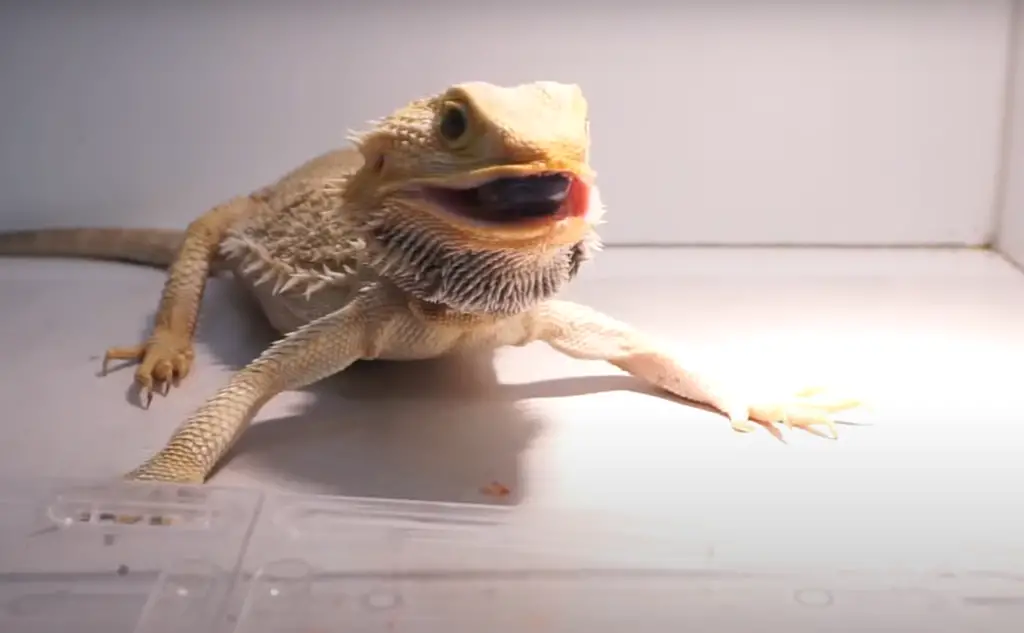
The key is to keep your pet’s diet balanced and varied. Be sure to mix up your bearded dragon’s diet with a variety of fruits and vegetables to keep them healthy and happy. Remember to consult with your vet first if you plan on adding blueberries to your pet’s diet or if you notice any negative side effects as a result of feeding this fruit to your pet. With a balanced diet, your bearded dragon will thrive and live a long and healthy life.
Frozen Blueberries for a Bearded Dragon
As a loving pet owner, you always want to ensure your bearded dragon is getting the best care possible. One way to do this is by providing them with a delicious, nutritious, and easy-to-make snack: frozen blueberries. Here, we will discuss the benefits of feeding frozen blueberries to your bearded dragon and how to prepare this treat.
Nutritional Benefits of Blueberries
Blueberries are a nutrient-dense fruit that is a great addition to your bearded dragon’s diet. They are packed with vitamins, minerals, and antioxidants that help support a healthy immune system, promote heart health, and aid in digestion. Blueberries are also low in fat and calories, making them a guilt-free treat for your bearded dragon.
Preparation Steps
Preparing frozen blueberries for your bearded dragon is a quick and easy process that requires minimal effort. All you need to do is wash the blueberries thoroughly, pat them dry, and freeze them in a single layer on a baking sheet. Once frozen, transfer them to an airtight container and store them in the freezer until you are ready to serve them to your bearded dragon.
Serving Size
When serving frozen blueberries to your bearded dragon, it is important to keep in mind the appropriate serving size. A general rule to follow is to feed your bearded dragon one or two blueberries per feeding session. It is also essential to monitor your bearded dragon’s intake of blueberries to avoid overfeeding them with this treat.
Mixing It Up
To add some variety to your bearded dragon’s diet, you can also mix frozen blueberries with other fruits and vegetables. Some recommended options include raspberries, blackberries, strawberries, mangoes, and leafy greens like kale and spinach. Mixing different fruits and veggies can provide your bearded dragon with a well-rounded diet that helps maintain a healthy weight and overall health.
How Your Bearded Dragon Will React
Once you serve your bearded dragon frozen blueberries, you will likely notice a positive reaction. Bearded dragons love treats, and blueberries can be an enjoyable addition to their diet. They may lick their lips, show signs of excitement, or even wag their tail in happiness.
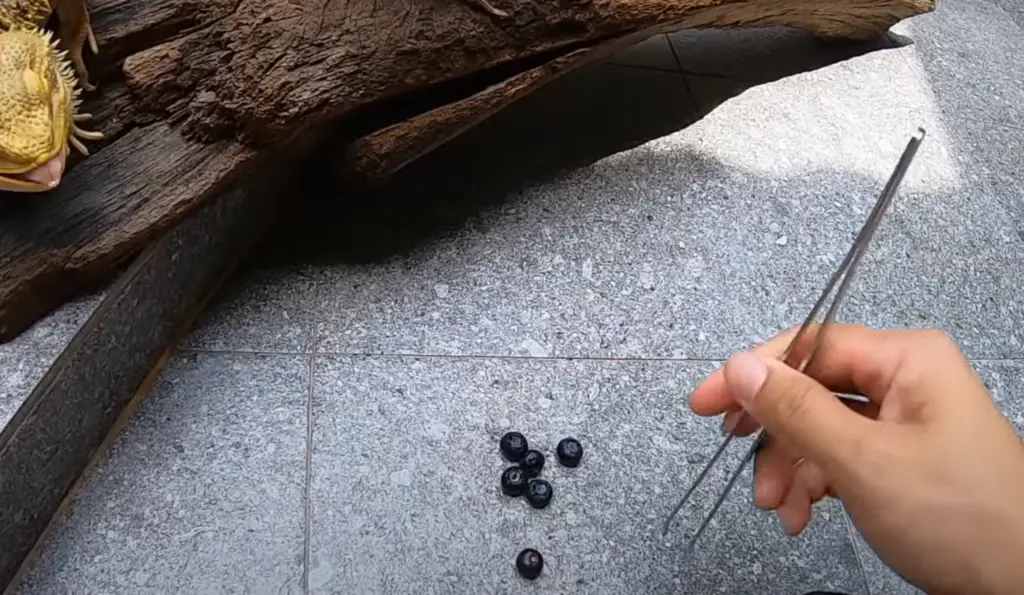
In summary, frozen blueberries are a tasty and healthy snack that can be beneficial to your bearded dragon’s diet. They are easy to prepare, store, and serve, making them an excellent addition to your bearded dragon’s mealtime. Just remember to serve them in moderation and mix things up to provide your pet with a variety of different nutrients. With a little bit of effort, you can give your bearded dragon a treat they will surely enjoy! [3]
How to Feed Blueberries to a Bearded Dragon: Step-By-Step Guide
Introduce blueberries slowly
When introducing these berries to your reptile pet, it is best to introduce it slowly. Start by offering them just a piece or two and wait for a couple of days before offering more. This will help you to closely monitor how your bearded dragon reacts to the new food. This is important because pretty often some new products cause digestive issues in your pet.
Cut blueberries into smaller pieces
As a rule of thumb, it’s better to cut blueberries into small pieces before you start feeding them to your beardie. This will make it easy for the dragon to eat, digest, and avoid choking. You can cut the blueberries into halves, thirds, or even quarters depending on the size of the blueberries.
Mix blueberries with other foods
Another way to feed blueberries to your bearded dragon is by mixing them with other foods. For example, you can mix blueberries with other fruits such as kiwi, papaya, or mango. You can also mix blueberries with vegetables such as kale, spinach, or carrots. This will create a colorful and nutritious salad that your bearded dragon will enjoy.
Do not overfeed blueberries
While blueberries are a healthy treat, it is also important not to overfeed them to your bearded dragon. Bearded dragons should be given a balanced diet that includes other foods such as insects, pellets, and veggies. A bearded dragon should have a diet consisting of at least 25% protein, 25% vegetation, and 50% fresh fruits.
Use fresh blueberries
When feeding blueberries to your bearded dragon, it is vital to use fresh ones. Avoid using canned, frozen, or preserved blueberries as they contain additives that may be harmful to your pet. Always wash your fresh blueberries before cutting them into smaller pieces.
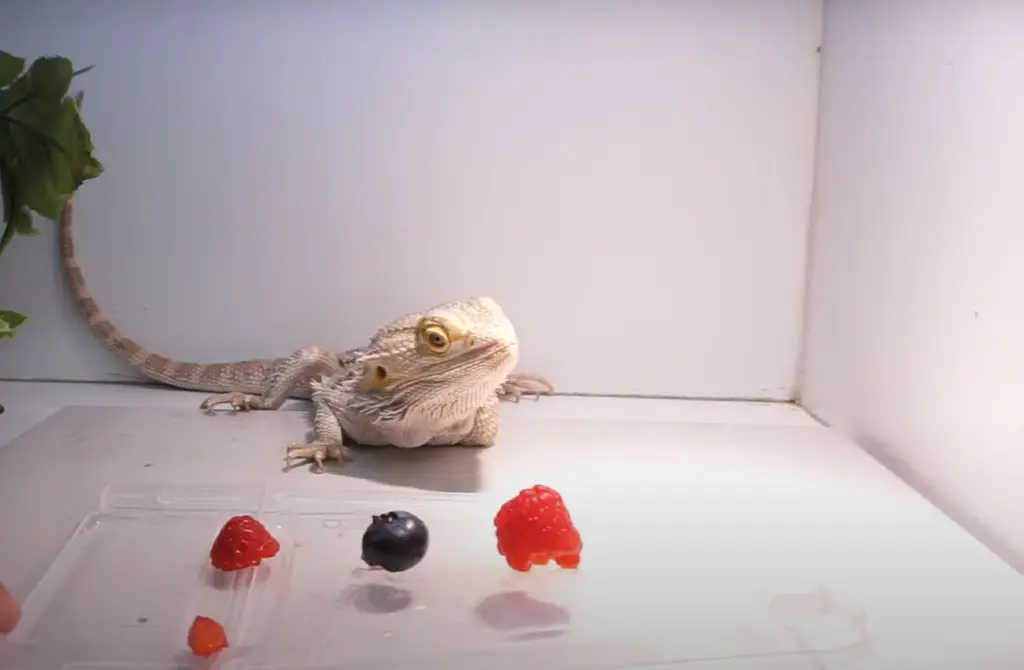
In conclusion, blueberries are an excellent treat for your bearded dragon as they are packed with vitamins and minerals. When feeding blueberries, always start slowly and cut them into smaller pieces. You can also mix blueberries with other foods or create a salad that your bearded dragon will love. Remember to balance your bearded dragon’s diet and feed them fresh blueberries. Finally, monitor your pet’s response as new foods may cause digestive or health issues. With these tips, you can safely and enjoyably feed blueberries to your bearded dragon.
Risks of Feeding Blueberries to a Bearded Dragon: Are There Any?
Bearded dragons are amazing and fascinating reptiles that have become a popular pet choice for many animal lovers. As a responsible pet owner, you might be wondering what kind of food is appropriate. Blueberries are known for their various nutritional benefits and antioxidant properties, but when it comes to feeding them to your bearded dragon, things are not that simple. In this part we will talk about some risks associated with feeding blueberries to bearded dragons.
Bearded dragons, like all reptiles, require a diverse and nutritional diet to stay healthy, active, and happy. This means that they need a balance of protein, leafy greens, fruits, and vegetables. While blueberries are known to be a good source of vitamin C, fiber, and antioxidants, they are not necessarily the best choice for bearded dragons. Blueberries contain high levels of oxalic acid, which can be harmful to your bearded dragon’s health when consumed in large quantities.
Oxalic acid occurs naturally in many plants and vegetables, including spinach, kale, and berries like blueberries. While it’s not always toxic, when an animal ingests too much of it, it can lead to the formation of crystals in the kidneys, which can cause serious health issues. That’s why feeding blueberries to your bearded dragon should be done in moderation and only as a treat in their diet.
Moreover, blueberries have high levels of sugar, which is not suitable for bearded dragons, as they are prone to obesity and other health problems caused by excessive sugar consumption. An excessive amount of sugar can cause digestive issues, including diarrhea, bacterial infections, and liver disease.
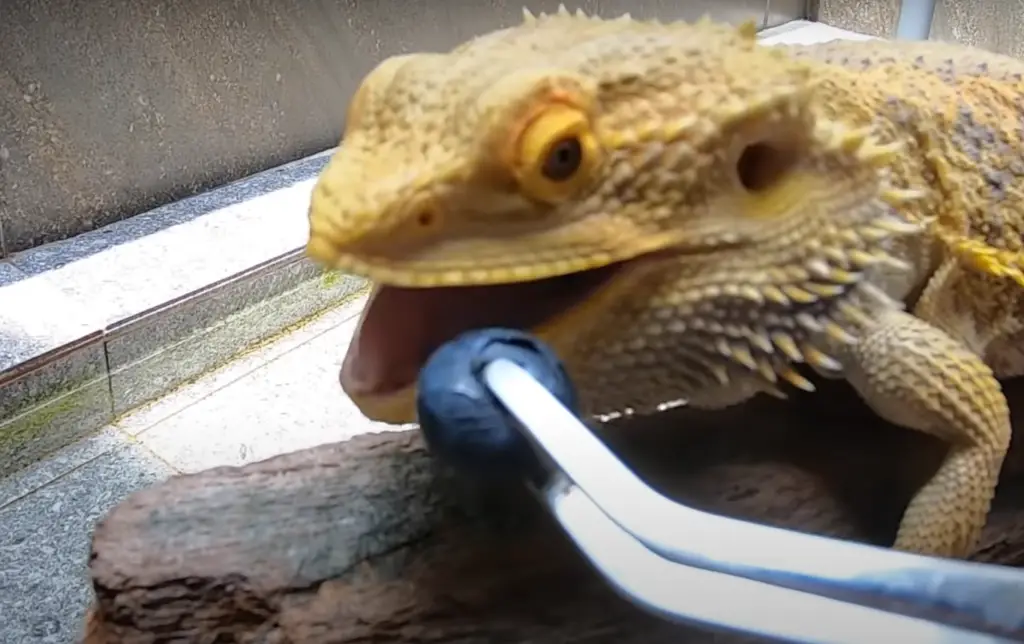
Another factor to consider when feeding blueberries to your bearded dragon is the potential for choking hazards. Blueberries are relatively small in size, and bearded dragons can quickly swallow them whole, leading to a potential choking hazard.
In conclusion, while blueberries offer certain nutritional benefits and antioxidants to humans, feeding them to bearded dragons can pose several risks. Because of their high levels of oxalic acid and sugar content as well as the potential choking hazard, it’s essential to avoid feeding blueberries to your bearded dragon regularly. As a responsible pet owner, it’s always best to stick to a balanced and diverse diet that meets all the nutritional requirements of your bearded dragon. Consult with your veterinarian or reptile specialist for a specific dietary plan that caters to the breed, age, and health of your bearded dragon.
FAQ
Can bearded dragons eat blueberries and raspberries?
Yes, bearded dragons can eat blueberries and raspberries. Berries are a great treat for your bearded dragon as they are packed with vitamins and minerals that are essential to their health. Blueberries and raspberries, in particular, are low in sugar content and have a good amount of fiber and antioxidants that can help their immune system fight off harmful toxins. Though it is important to note that berries should never be the main staple of a bearded dragon’s diet.
What fruit is toxic to bearded dragons?
Citrus fruits such as oranges, lemons, limes, and grapefruits are toxic to bearded dragons. These fruits can cause many digestive issues, such as diarrhea, vomiting, and even dehydration. Citrus fruits should never be given to a bearded dragon, and if they accidentally consume them, it is essential to seek veterinary care immediately.
What berries can bearded dragons not eat?
Although berries are generally safe to feed your bearded dragon, there are a few that should be avoided. Grapes, strawberries, and blackberries are high in sugar and should not be fed to your bearded dragon in large amounts. These berries can cause an upset stomach and may lead to health complications in the long run.
Why is fruit bad for bearded dragons?
While fruits, in general, are not bad for bearded dragons, they can be detrimental to their health if fed in large quantities. Fruits tend to have a higher sugar content than vegetables and can cause digestive issues such as diarrhea, bloating, and even obesity. A diet primarily composed of fruits can result in health complications, which can lead to long-term health problems.
Useful Video: Bearded Dragons Go Crazy For Blueberries! What Fruits Do Beardies Like?
Conclusions
In conclusion, bearded dragons can eat blueberries, but they should be looked at as more of an occasional snack or treat rather than a core part of their diet. Too many blueberries can lead to digestive issues and a lack of nutritional value. Remember to always wash the blueberries before serving them to your pet and to keep the portions small. As always, if you have any concerns about your bearded dragon’s health or diet, consult your veterinarian. With the proper care, feeding, and attention, your bearded dragon will thrive and lead a long, healthy life.
References:
- https://www.webmd.com/pets/what-to-know-about-bearded-dragons#:~:text=The%20bearded%20dragon%20is%20a,variations%20in%20color%20and%20texture.
- https://dragonsdiet.com/blogs/dragon-care/can-bearded-dragons-eat-blueberries
- https://beardeddragontank.com/can-bearded-dragons-eat-blueberries





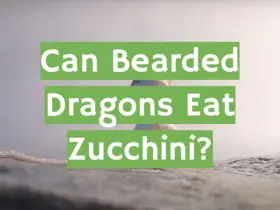
Leave a Review